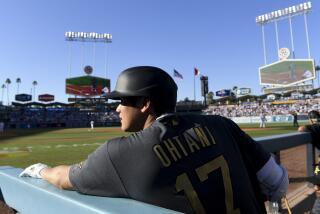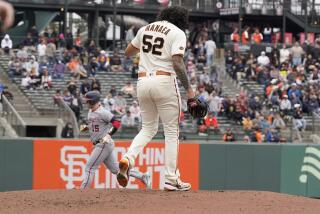Soon to Be Ex-Expos
MONTREAL — Only a few thousand fans showed up to watch the Montreal Expos play baseball the other night, barely enough to cause a murmur, a death rattle, in Olympic Stadium.
Pop fouls ricocheted off empty seats. Vendors at the snack bars -- the few that were open -- stood idly.
Henry Cukoff, sitting above the visitors’ dugout with almost an entire row to himself, tried to act as if he did not care.
“To be frank, it’s been over for years,” the longtime Expo fan said. “I’m used to it.”
Don’t you believe him, his girlfriend chimed in. “He can say what he wants, but he’s going to miss them,” Myra Abrams said. “More than his dead brother.”
Tonight, the Expos face the Florida Marlins in their final home game, probably the last they will ever play in this city. League officials are expected to announce today that the club is relocating to Washington, D.C.
The fans in Montreal have reacted with a mixture of resignation and dread.
Resignation because they have grown weary of a team that cannot keep its best players and has threatened to leave before. Dread because this time the threat is real.
One by one, they have seen obstacles to the move evaporate. Baltimore Oriole owner Peter Angelos reportedly is close to a compensation package for allowing a team in the area.
The league is expected to get a two-thirds vote from the other owners and a stadium deal from Washington. A legal challenge by the Expos’ former limited partners is not expected to be an impediment.
Terrmel Sledge, the Expos’ talented rookie from Granada Hills, was expecting bigger crowds this week, if only because people might want to say goodbye.
“They’re probably just fed up,” he said. “I would be too.”
After years of top-notch minor league baseball -- Jackie Robinson played here -- the Expos arrived in 1969. Almost 30,000 people showed up for that first game at Jarry Park, and, over the years, a relationship grew.
“I think they really started to grasp the game,” said Tim Raines, a former Expo star who now manages in the club’s farm system. “To hear them scream and holler, it made you want to play harder.”
There were good years through the late 1970s and ‘80s, seasons when attendance topped 2 million.
That was when Dominique Mandanice started selling beer at Olympic Stadium. “A summer job I never left,” he calls it.
Taking a break on a recent evening, pushing back his red cap to wipe away the sweat, Mandanice talked about the players who have come through Montreal.
Gary Carter and Andre Dawson. Pedro Martinez, Andres Galarraga and Vladimir Guerrero.
Pete Rose collected his 4,000th hit as an Expo. In the summer of 1991, Dennis Martinez pitched a perfect game against the Dodgers.
“Great players,” Mandanice said.
But, like other fans here, he was just as quick to mention all that went wrong. Several incidents stand out.
The first -- known as “Blue Monday” -- occurred in 1981 when the team won its division in a strike-interrupted season and faced the Dodgers in the National League championship series.
In the deciding fifth game, one inning from the World Series, the Expos lost when the Dodgers’ Rick Monday hit a home run.
If that defeat shook the Montreal faithful, it was nothing compared with what happened in 1994.
The Expos raced to a 74-40 record that season and were favored to reach the Series with a roster that included Martinez, Marquis Grissom and Larry Walker. Then came another strike.
Charles Bronfman had sold the club a few years earlier, and the new owner, Jeffrey Loria, seemed to lose interest when play resumed the next season.
Handicapped by a weak Canadian dollar and scant television revenue, the club could not -- or would not -- compete for talent. There would be no more dreams of a championship, no more 2-million attendance seasons.
Rumors of the team’s leaving became a rite of spring in Montreal.
The Expos will finish last in home attendance for a fourth consecutive season, averaging about 9,000 fans a game, or roughly 32,000 less than the Dodgers and Angels.
Those who have hung on -- a loyal few -- have looked for a bright side to the protracted funeral march.
Michel Filteau of Encore Baseball Montreal, a fan group trying to keep the team, called the mood among his fellow members “very sad, very mad.” In the clubhouse after a recent game, Manager Frank Robinson said wearily: “We’ll give it our best. That’s what we’re going to do until the end.”
That might be the cruelest part. Despite reports that baseball already has made a decision, a spark of hope remained.
“Hoping that it’s not the last game,” Raines said. “Hoping for some miracle.”
As of Tuesday afternoon, the team had sold about 10,000 tickets for tonight’s game. Cukoff will be there, as always, but he doesn’t expect baseball to change its mind.
Still, when he comes to the ballpark, he said he will keep this thought: “One more season.”
*
*
(BEGIN TEXT OF INFOBOX)
Expos’ Attendance
Montreal Expos’ attendance at Jarry Park (1969-1976) and Olympic Stadium (1977-2004) and how it compares with the rest of the National League. Figures through Sept. 27 (*22 games played at Hiram Bithorn Stadium in Puerto Rico in 2003, and 20 in 2004. Expos averaged 14,222 for 2003 in Puerto Rico and 10,445 for 2004):
*--* Year Game Avg Attendance League Avg 1969 14,970 1,212,608 1,257,912 1970 17,589 1,424,683 1,388,517 1971 16,037 1,290,963 1,443,738 1972 14,643 1,142,145 1,294,144 1973 15,393 1,246,863 1,389,610 1974 12,660 1,019,134 1,414,860 1975 11,213 908,292 1,383,374 1976 7,984 646,704 1,388,377 1977 17,701 1,433,757 1,589,186 1978 1,7617 1,427,007 1,675,577 1979 26,277 2,102,173 1,764,868 1980 27,261 2,208,175 1,760,340 1981 28,418 1,534,564 1,039,866 1982 28,621 2,318,292 1,792,285 1983 28,650 2,320,651 1,795,774 1984 19,957 1,606,531 1,731,786 1985 18,665 1,502,494 1,857,680 1986 14,025 1,128,981 1,861,123 1987 22,844 1,850,324 2,061,180 1988 18,255 1,478,659 2,041,606 1989 22,019 1,783,533 2,110,320 1990 16,952 1,373,087 2,040,959 1991 11,612 934,742 2,058,014 1992 20,607 1,669,127 2,009,261 1993 20,265 1,641,437 2,637,470 1994 22,390 1,276,250 1,843,416 1995 18,189 1,309,618 1,793,589 1996 19,959 1,616,709 2,169,949 1997 18,489 1,497,609 2,277,526 1998 11,295 914,909 2,401,674 1999 9,540 773,277 2,380,436 2000 11,435 926,272 2,480,194 2001 7,935 642,745 2,481,346 2002 10,031 812,045 2,309,294 2003 12,662 1,025,639 2,273,813 2004 9,125 711,739 2,390.301
*--*
More to Read
Go beyond the scoreboard
Get the latest on L.A.'s teams in the daily Sports Report newsletter.
You may occasionally receive promotional content from the Los Angeles Times.











